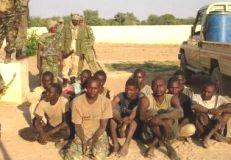Sudanese janjaweed, Chadian rebels, spread violence into Chad
Feb 21, 2006 (NEW YORK) — Janjaweed militias and Chadian rebel groups with support from the Sudanese government are launching deadly cross-border raids on villages in eastern Chad, Human Rights Watch (HRW) said in a new report released today.
 HRW called on the African Union Mission in Sudan to proactively patrol strategic points along the Chadian border to deter further attacks against the civilian population, and on the United Nations Security Council to urgently authorize a transition of the African Union force in Darfur to a U.N. mission.
HRW called on the African Union Mission in Sudan to proactively patrol strategic points along the Chadian border to deter further attacks against the civilian population, and on the United Nations Security Council to urgently authorize a transition of the African Union force in Darfur to a U.N. mission.
The 15-page report, Darfur Bleeds: Recent Cross-Border Violence in Chad, based on a HRW investigation in eastern Chad in January and February, documents an alarming rise in attacks against civilians in Chad by Sudanese government-backed Janjaweed militias and Chadian rebel groups. The Janjaweed and Chadian rebel forces operate from bases in Sudanese government-controlled areas of Darfur. Sudanese government troops and helicopter gunships have at times supported these cross-border attacks in eastern Chad. The Sudanese government provides support for several Chadian rebel groups, including harboring them on Sudanese territory.
“The government of Sudan is actively exporting the Darfur crisis to its neighbor by providing material support to Janjaweed militias and by failing to disarm or control them,” said Peter Takirambudde, Africa director at Human Rights Watch. “The Janjaweed are doing in Chad what they have done in Darfur since 2003: killing civilians, burning villages and looting cattle in attacks that show signs of ethnic bias.”
Sudanese forces have had a direct hand in the recent violence in Chad, according to witnesses interviewed by Human Rights Watch in eastern Chad. For example, Sudanese troops and helicopter gunships reportedly supported a Janjaweed attack across the border in the region of Goungor, Chad, on two occasions in early December.
Tens of thousands of Chadian civilians have been internally displaced by the violence, most of them from the Dajo and Masalit, non-Arab ethnic groups that have also been systematically targeted by the Janjaweed in Darfur.
The report said that Sudanese Janjaweed leadership is implicated in attacks in Chad. Two well-known Janjaweed militia leaders known to be closely allied to the Sudanese government are likely among those responsible for the violence in the area south of Adré. Hamid Dawai and Abdullah abu Shineibat were among the seven Janjaweed militia leaders named, by the United States (U.S.) Department of State in 200433 and in reports by HRW and others, as leaders of some of the most abusive Janjaweed forces in West Darfur.
Also, it mentions coordination between Sudanese militia and Chadian RDL rebels. It says that not just the Janjaweed but the RDL receive material and other support from Sudanese government forces. RDL rebels have several bases in West Darfur around Geneina, where Janjaweed militias and RDL rebels are said to occupy nearly adjacent camps (and where the Sudanese government has a substantial military presence), and in southern West Darfur. They have also been spotted in West Darfur in the company of government of Sudan army-sponsored Popular Defense Force militias.
The most immediate consequence of the continuing insecurity in eastern Chad has been the displacement of civilians: 30,000 Chadians fled their homes along the Chad/Sudan border due to recent violence. HRW visited a village, Koloy, that had a pre-conflict population of 1,904, but now hosts 10,000 to 12,000 internally displaced persons, many of whom have sought refuge since December.
The number of attacks has increased dramatically since December, resulting in dozens of civilian deaths and the displacement of tens of thousands more people. HRW again called for the U.N. Security Council to urgently transfer the African Union force to a U.N. mission. That mission should have a strong and clear mandate to protect civilians, by force if necessary. HRW also called on the U.N. Security Council to place Janjaweed leaders Hamid Dawai and Abdullah Shineibat, as well as other individuals publicly named as responsible for attacks on civilians in Chad, on the list of persons to be subject to travel bans and other sanctions by the U.N. Sanctions Committee.
“The governments of Sudan and Chad, the African Union Mission in Sudan, and the international community must do more to ensure the security of the population in the border region and prevent the expansion of ?ethnic cleansing’ into Chad,” said Takirambudde. “Civilians must be protected from attacks at the hands of the Sudanese government, Chadian rebels and Janjaweed militias.”
(ST/HRW)
Full text of the HRW report is available at http://hrw.org/backgrounder/africa/chad0206/
